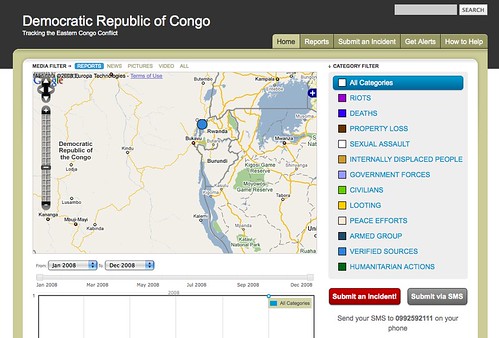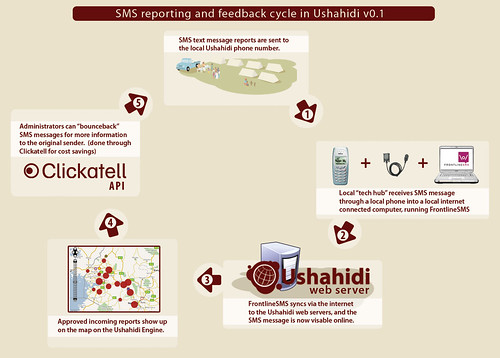When we pushed the first version of Ushahidi live in Kenya, I was trying to juggle that as I spoke at a conference in New York. Today, we’re deploying the new Ushahidi Engine (v0.1) into the Democratic Republic of the Congo (DRC), and I’m in Rhode Island speaking at another conference. I’m starting to see a pattern emerge…
Reporting Incidents from the Congo
The DRC deployment can be found at http://DRC.ushahidi.com, and the mobile number to send SMS reports to is +243992592111.
Note: This is the alpha software for Ushahidi. If you find any problems, please submit them to bugs.ushahidi.com.
How you can help
Get the word out. Let people know the mobile number (+243992592111) and website (drc.ushahidi.com). Help get word to the Congolese on the ground in the DRC of this tool, that’s who needs to know about it.
Things are serious in the Congo… They are bad, very bad. As Sean Jacobs states:
“Since August this year at least 250,000 people have been left homeless in Eastern Congo in the latest outbreak of a civil war described here as between government troups and a rebel group claiming to protect ethnic Tutsis. At least 2 million people are refugees from that war which dates back to 1996.”
It’s a difficult situation, with a swirling mixture of militia and armed forces, compounded by particularly brutal and confusing activities. External military forces, years of displacement and a misinformation mar the landscape.
A new Ushahidi, a new test
To be quite honest, we’re a little nervous, just as we were the first time. The new engine still has a few bugs, and there are some process flow issues that we’re still trying to get figured out. This time we’re backed up by a group of competent developers who are working to get things straightened out. Want to help us make it better? It’s an open community, and we’re looking for your input.
We are VERY interested in hearing from you on how we can make the system better. If you have ideas, thoughts, comments – tell us. Leave them in the comments here, on the Ushahidi blog, or on the Ushahidi contact form.
This is a test of the system, albeit a very difficult one, but it will affect the way the software is changed, modified and upgraded in the next version. What we get right here, we can make work for you in your area when you need it.
How SMS messages route through Ushahidi
This simplified graphic was created to show how SMS messaging moves through the Ushahidi system – it’s a 2-way communication cycle.
- An SMS gets sent to a local number
- It passes through FrontlineSMS
- This syncs with Ushahidi
- The message shows up on Ushahidi
- Admins can decide to send a message back to the original sender
We use FrontlineSMS so that we can provide local numbers in areas where the larger SMS gateways don’t operate. For instance, if you were to try to run this in Zambia, you’d probably get a UK phone number if you went through Clickatell. However, we do use Clickatell for the messages that we route back to the original sender due to cost savings. They also have a very nice, easy to use API.


November 7, 2008 at 1:28 pm
Hash, I got the message earlier from you, what i wanted to tell is that unless there are french instructions (at least), local people would have a hard time understanding this. rwanda, congo, it’s rare to see natives talking in english
November 7, 2008 at 1:41 pm
@Heri – we’re working on the French translation right now. We just got the flat file back last night, so hopefully we’ll get it up soon.
November 7, 2008 at 2:58 pm
What do I do if I want to try out an implementation of Ushadidi in my area/country?
November 7, 2008 at 3:37 pm
@Geir – just get with us through the Ushahidi contact form (http://www.ushahidi.com/contact) and we’ll give you access to the code repository. It’s alpha code though, so be forewarned that you’ll have to do quite a bit of monkeying around with it.
November 14, 2008 at 9:21 pm
how is the test run going?
November 17, 2008 at 9:05 pm
Congratulations on the expansion of Ushahidi, though how unfortunate that it is needed in another crisis on the continent. I find the innovative uses of the cell phone all across Africa fascinating as a college student in the United States. When I first travelled to Kenya to study abroad, I had no idea how accessible and popular mobile phones would be, but quickly learned from the national “mobile culture” that has sprouted up amongst my Kenyan peers. Honestly, the prevalence of cell phones was a bit shocking, to the point that I met people who lived in complete poverty, sometimes without access to clean water or electricity, spending a large proportion of their income on mobile phones and prepaid minutes. Do you think that this is a phenomenon that we should worry about, or is it simply a shaky bridge that will inevitably lead to economic growth and development?
Another question I had was about the raw numbers of cell phone users in the areas that you work in. While mobile penetration has indeed surprised us all, there are still millions of Africans who do not own a phone. In areas of crises, violence and poverty, do those who really are in need have access to phones to use Ushahidi? Further, even if they do have phones, do they have access to prepaid minutes in order to use the SMS feature? In conclusion, what I am asking if we should really believe the hype about mobile technology reaching the masses and single-handedly revolutionizing development on the continent?
Finally, I would like to thank you for all of the work you do, especially by focusing on all of the indigenous innovations popping up in Africa. Your blog goes a long way in dispelling many of the stereotypes of the continento prevalent in mainstream Western media that really make me cringe.
March 11, 2010 at 9:27 pm
Hi i am glad for this site,please i have forwarded this site a several people who have connection to DRC,Thanks what is happening to our brothers and sister is a catastrophy we as kenyans cannot sit and watch this god given country is going to waste.